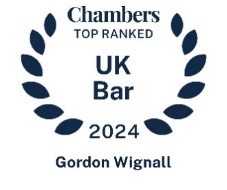Gordon Wignall is an experienced common law practitioner whose main interests are in the regulatory environment and remedies for pollution (whether contamination of the air, soil, groundwater or waterbodies). He has a strong presence in environmental permitting matters.
He has a very wide knowledge of various types of regulatory proceedings (including by way of judicial review, statutory review, tribunal and criminal matters). He is familiar with principles of EU law relevant to his specialist areas (such as end-of-waste and the Water Framework Directive).
Highlights include a number of prominent Divisional Court / Court of Appeal cases, in particular Hounslow LBC v. Thames Water (whether sewage works are excluded from the statutory nuisance regime), Arscott v. Coal Authority (flood water as the ‘common enemy’ and Ball v. Hinckley & Bosworth DC (powers and duties of local authorities in the context of abatement notices).
In litigation, Gordon’s preference is to work closely with both solicitors and clients as a team, advising and identifying the best evidence in order to provide the most robust advocacy. Whilst direct access work is undertaken in appropriate regulatory and advisory cases, a good solicitor can be sourced to take the strain when necessary. He has acted successfully for direct access clients in a variety of area, including nuisance and water issues arising out of surcharging and other drainage events
Gordon has been instructed for many years in various types of group litigation, including private / public nuisance, consumer redress schemes, financial services and professional negligence.
To view in more detail Gordon’s experience, see the attached practice-specific profiles below:
New Online Resource
Gordon Wignall has published and maintains www.wiglaw.co.uk which currently carries open access articles on the law of nuisance.
SERVICES PROVISION INFORMATION
(1) Services to professional clients are offered on the most recent version of the terms available (a) on a contractual basis as set out on the Bar Council website, and (b) on a contractual CFA basis as set out on the Chancery Bar Association website. (2) Services to clients are offered on similar contractual terms to those offered to professional clients. (3) Gordon Wignall (a) has professional insurance with BMIF and top-up insurance provided via BMIF, and (b) is subject to the Code of Conduct in Part 2 of the Bar Standards Board Handbook, Part 5 of which sets out how to make a complaint if a complaint is not resolved internally. See also the Client Care section of Chambers’ website.



Environment
“He is a winner with clients – he’s easy to work with and is approachable… great with the clients and builds a real rapport with the court.” “A junior of choice for environment”; “His knowledge of his area is extremely deep and extensive.”
Chambers UK Bar Guide
“His written work is second to none and he has an encyclopaedic knowledge of environmental law.”
Legal 500
Gordon Wignall has a specialist understanding of all aspects of environmental and planning work. He has a particular interest in the waste, recycling and associated industries and in the agricultural and related sectors (extending to habitats law). Pollution issues, including contaminated land, flooding, noise, odour, fire, air quality and water pollution, constitute a significant part of his work. He is a recognised expert in litigation relating to private, public and statutory nuisance (including s.82 proceedings) and has written and lectured in the area.
Gordon had an unusual training which encompassed both complex commercial law as well as serious crime. This has given him a strong grounding in both written and oral advocacy and there is a balanced application of both in his practice. He is familiar with conflicts of laws and arbitration principles. He advises and provides representation in overlapping areas which have environmental issues as their subject matter, including contract and professional negligence.
He has been instructed in many cases covered by a group litigation order.
Gordon is accustomed to working under pressure and as part of a team. As well as acting for private operators on the receiving end of applications for injunctive relief, he has obtained injunctions on behalf of local authorities where other remedies have proved inadequate. He is familiar with issues of privacy and confidentiality and has been instructed in proceedings before the Investigatory Powers Tribunal (RIPA surveillance powers).
He is very familiar with costs issues in all courts tribunals, also being a recognised advocate in costs cases. Even at initial stages of his instructions he will have in mind the likelihood of the recovery of costs. He has advised and provided representation in respect of the separate liabilities of group undertakings and their individual officers (including piercing the corporate veil).
Recent environmental cases include a 9-day hearing in a widely publicised residential noise nuisance dispute, judicial review challenges to the environmental regulation of waste oils and contaminated soils, ongoing group litigation about manufacturing from timber and animal rendering and the criminal consequences of river pollution and fire.
He is a co-author of the Chambers 2018 Environmental Law Guide (edited Hogan Lovells).
Not surprisingly, Gordon is especially pleased to be able to assist in claims where complex expert evidence needs to be presented or disputed. This may arise in any of the areas in which he provides and has provided assistance, whether in civil, criminal or administrative proceedings, including the following:
Experience by reference to subject areas, businesses and trades:
• Agricultural feed production and bedding
• Animal rendering (classes I and III)
• Animal bedding
• Aluminium foundries
• Asbestos
• Biomass operators
• Brassica growers
• Car manufacturing
• Colliery working (and spoil heaps)
• Combined heat and plant operators
• Composting plants
• Construction sites
• Contaminated soils
• Controlled waste
• Dairy processing (cheese, milk and whey)
• Demolition contractors
• Demolition waste
• Developers
• Diesel spills
• Dog owners
• Dust generation
• Fertiliser manufacturers
• Flooding
• Gamekeepers
• Garages
• Exercise gym in Central London
• Highways
• Kennels
• Kerosene spills
• Knackermen
• Land drainage
• Landfill operators
• Landowners
• Meat processors
• Motor racing circuits (racing car, motocross and motorcycle)
• Motorcycling training venues
• Music festivals
• Nursery school business
• Oil spills
• Paint manufacturers
• Paper/cardboard collection
• Potato washing plants
• Public houses
• Rendering operators
• Reservoirs
• Residential occupiers and their premises (tonal, impact and services noise and vibration)
• Retail development
• Scrap yards
• Septic tanks
• Sewage treatment plants
• Sludge handlers
• Smoke, flues, chimneys and stacks
• Spoil heaps
• Steel foundries
• Storage tanks
• Subsidence
• Transportation
• Trees
• Tree root subsidence and ‘heave’
• Turbine operators
• Vehicle testing and maintenance operators
• Waste brokers
• Waste oil (processed and re-refined products)
• Waste paper brokers and exporters
• Waste transfer stations
• Waste water treatment plants
• WEEE
• Wood recycling and treatment
Civil law and statutory nuisance claims
Gordon provides pre-litigation advice, such as for producers seeking approval for end-of-waste status and for parties to leasehold agreements (advising for instance whether a break notice or notice of termination has been validly served). He has experience in contractual and also in trespass / boundary disputes, which he uses in appropriate cases. He has presented numerous claims under the group litigation principles used in the civil courts (he provided claimant representation in the VW emissions proceedings).
Many claims in which Gordon is involved concern issues relevant to pollution. He has an
extensive track record of private, public and statutory nuisance proceedings, litigating the following issues, many of which are recurrent topics:
• Compensation levels in cases of amenity damage
• Compensation where remediation is required
• Compensation in ‘stigma’ cases – oil, kerosene and other spills
• Costs in statutory nuisance proceedings
• The corporate veil: when can it be drawn aside?
• Discovery of documents in both criminal and civil contexts
• The existence of alleged easements to pollute (noise and odour)
• Evidence corroborating complaints of nuisance: its legitimate extent
• Flooding, including ‘the common enemy’ (Gordon’s Court of Appeal case on the
‘common enemy’ as a defence to flooding remaining the lead authority on the topic);
he is familiar with the initial expert evidence required to establish causation
• Group Litigation and Group Litigation Orders
• Leases: can a break clauses be activated where there is an issue as to pollution?
• Leases: is the change in an energy subsidy a frustrating event?
• Injunctive relief: when should it be granted?
• Injunctive relief: is compensation an adequate alternative?
• Injunctive relief: a simple order of abatement, or should works be required?
• Interim injunctive relief
• Why make a claim in negligence if there is a claim in nuisance?
• Pre-action disclosure
• Prescription – has the right to pollute been established?
• Public nuisance as a means of defeating a right to prescription
• ‘Reasonable user’ as a defence in nuisance
• Sentencing under the environmental sentencing guidelines
• Statutory nuisance and ‘best practicable means’
• Strict liability for fire, spills and other dangerous activities
• Threshold considerations: is there a nuisance at all?
• Costs budgeting and liability for adverse costs
Gordon is pleased to assist in smaller statutory nuisance cases (as well as in s.82 proceedings).
His experience includes the following (at first instance or on appeal), often requiring detailed expert evidence as to both the threshold requirements and the question of ‘best practicable means’:
• noise from car works, garages, gyms, colling plant, racing tracks, schools, dogs, kennels,
construction works, parties, refrigeration units, festivals and pubs
• odours, smoke and dust from food plants, biomass units, composting plants, potato
washing units, sewage treatment plants, foundries, renderers and other works.
Defending environmental prosecutions
Gordon has represented defendants (both corporate and individuals) in the Magistrates Court, the Crown Court and on appeal, including in the Court of Appeal. (His reported cases concerning the admissibility of evidence are in the context of murder and were decided on appeal to the Privy Council).
The criminal cases he has undertaken have been concerned with various offences arising out of the management and handling of waste, asbestos, fraud, breaches of abatement notices contrary to the statutory nuisance regime, offences contrary to the Control of Pollution Act and HSE prosecutions.
Gordon was instructed in the Crown Court in the first major prosecution by the Environment Agency concerning the transfrontier shipment of waste, and he has practical experience in transfrontier issues relating to waste electrical products, metals and paper products. He has advised or provided representation for corporate and individual clients in respect of shipments destined for Rotterdam, Saudi Arabia, West Africa, Cuba and South America. TFS prosecutions have concerned issues which include the meaning of “waste” and the factual question whether there has been ‘contamination’. His knowledge of international trade documentation has been of considerable assistance.
The criminal proceedings in which Gordon has been instructed have required him to address the following specific issues (all in the context of prosecutions concerning waste sectors mentioned above in the subject areas listed in this c.v.):
• Allegations of consent, connivance and neglect against directors and other officers
• ‘Blending’ of waste (flock and trommel fines)
• Asbestos
• Causes of pollution
• Dairy processing
• Corporate offences
• Costs recovery
• ‘Culpability’ (deliberate, reckless, negligent etc.)
• Disclosure (an extensive application process in one case finally resulting in the offering of
no evidence by the prosecution)
• Environment Agency ‘under-enforcement’ and its consequences for defendants
• Fires
• Fraud charges (with no evidence being offered in one case on the entering of pleas)
• ‘Harm’ categorisation
• Illegal landfills
• Landfill tax avoidance
• Landfill cover
• Landfill spreading
• ‘Mis-descriptions’ of waste: incorrect waste codes
• Operating waste sites without a permit or outside the terms of a permit
• Operating waste sites outside the terms of permitting exemptions
• Ownership of land used by others to spread processed waste
• Sentencing under the Environmental Offences Guidelines 2014 (including mitigation as
to immediate / suspended terms of imprisonment)
• Storage of waste in excessive quantities
• Transfrontier shipments of waste consignments, including the consideration of
commercial and export documentation relevant to different jurisdictions
• Regulations 12, 38 and 41, Environmental Permitting Regulations 2010 (and successor
regulations)
• Section 33, Environmental Protection Act 1990
• Section 82 proceedings (summary proceedings by persons aggrieved of a statutory
nuisance)
Public (administrative) law proceedings / permits, licences and PINS
Gordon‘s environmental work includes judicial review and statutory appeals under the planning regime, including ‘conventional’ planning cases (such as housing or retail development). He was involved in a recent challenge to the regulation of the waste oil industry.
His PINS cases also regularly concern suspension notices, enforcement notices and works notices, as well as waste exemptions. He has acted for many of the most well-known recycling companies active in England & Wales. The question whether to apply for judicial review of a regulatory notice or to initiate a statutory appeal (or even both) can be a very difficult one, a matter on which he has advised and provided representation on a number of occasions.
Gordon was counsel for the successful claimant in the main judicial review authority concerning enforcement notices under the Permitting Regulations, and continues to have an in-depth understanding of the circumstances in which an urgent application to the High Court is necessary in order to keep a business alive when faced with a regulatory notice. He also has experience of the practical matters necessary to contest the rarely-used provisions of the Water Resources Act used by the Environment Agency to protect water from pollution.
Gordon is familiar with the correct application of the Core Guidance procedures invoked by the Environment Agency when rejecting an application for an environmental permit on grounds of competence.
Planning appeal work for waste and recycling clients has included issues relating to noise, applications to introduce machinery, agricultural waste, spoil and landfill sites and WEEE.
Gordon has advised applicants in many regulatory areas where a permit or licence is required, including those issued by the Environment Agency and Natural England. He has acquired a good working understanding over the years of English and Welsh law as it has developed under EU law, including the Waste Framework Directive, Industrial Emissions Directive, Air Quality Directive, By-Products Regulations, Water Framework Directive, Habitats Directive and the Birds Directive. He is very familiar with canons of both domestic and EU legislative interpretation and their application to detailed facts.
As to permitting exemptions, Gordon has successfully presented judicial review applications in the High Court in which it has been alleged that the UK has not transposed the exemption provisions of the Waste Framework Directive correctly. He has advised processors and re-refiners of waste oils as to the scope of various provisions emanating from the Waste Framework Directive. He has acted for various waste brokers and transporters.
Gordon has some 30 years’ experience of judicial review, case stated and statutory appeal
proceedings in a number of the subject areas set out above at the beginning of this c.v.
Particular administrative / statutory appeal issues have included the following:
• Aarhus and costs issues
• Aarhus and public participation
• The boundaries of an “abuse of power” and legitimate expectations
• ‘Better regulation’ and regulatory reform issues
• The ‘duty to give reasons’
• The ‘duty of sufficient inquiry’ (before serving a regulatory notice)
• End of waste
• Challenges to regulatory enforcement decisions and notices
• Environmental permits and ‘competence’ of the operator
• The EU Charter of Fundamental Rights and its application
• Exemptions under the Environmental Permitting Regulations
• Licences to shoot under the Deer Act and habitats legislation
• Local authority housing land supply
• ‘Localism’
• NPPF (‘National planning policy framework’)
• The overall proportionality of a decision under challenge
• Statutory interpretations and the meaning of rules and regulations
• Statutory nuisance: judicial review or case stated on appeal?
• Sustainable development
• Whether a decision is unreasonable (in a legal sense)
• Waste Framework Directive issues
Whilst residential and retail planning appeals have been part of his practice these too tend to include issues relating to the Aarhus convention and EU-related matters such as Environmental Impact Assessments.
Additional
In appropriate circumstances direct access instructions are accepted, including at the pre-issue stage of litigation. Referrals can be provided to suitably qualified solicitors.
Gordon has been a joint author of the commended website “Waste Management Permit
Lawyers” which contains information as to permitting and pollution control.
See www.wiglaw.co.uk
Civil & commercial
“Understands the complexity of multi-party claims and is particularly knowledgeable on CFAs.”
Legal 500
“He is very impressive on a detail and tactical level, using processes and applications to take a tough line.”
Chambers UK Bar Guide
Gordon has a wide and varied practice with practical experience of different regulatory and specialist areas. He has a special interest in group litigation.
He is authorised to practice from the Law Library, Dublin.
Group litigation
Gordon has conducted and assisted in the management of numerous multi-party actions
under the GLO provisions of Part 19, CPR (and otherwise). These include the following types of cases:
• Financial services (including the FSMA collective redress procedure)
• Professional negligence (solicitors and banks)
• Consumer protection
• Landlord and tenant
• Environmental (pollution) cases
• VW emissions
• Personal injury and defective products
He has also advised and provided representation in competition and data protection cases.
He has a great deal of expertise in costs and litigation funding and was formerly on the
editorial board of the White Book (Civil Procedure Rules). He was the editor of the Law Society Guide to CFAs. (See further below.)
Individual claims
Gordon is experienced in contractual disputes: sale of goods of different descriptions,
breaches of covenant and general contractual disputes of various descriptions.
In private individual cases, he has experience of restraint of trade (including injunctive relief), wrongful dismissal, restitution, ‘piercing the corporate veil’, breach of confidence and advice and representation in disciplinary proceedings.
His fraud experience includes all forms of claims including FSA-unregulated investments and offshore property schemes (including CEPPs).
In negligence-related matters his case work has included claims against banks for negligence in the conduct of mortgage and property transactions and claims for and against IFAs and other professionals.
He is a recognised expert in private nuisance, including flooding, leasehold flats, noise
nuisance, smoke, animal by-products and WEEE. Other special areas of interest include waste, ship recycling and waste transhipment.
He has undertaken judicial review work in various regulatory contexts, especially in
environmental and financial services cases. In appropriate cases he defends criminal
allegations made by regulators.
Injunctive relief
Gordon is familiar with the principles relating to injunctive relief for the preservation of trust property; freezing injunctions; restraint orders; receivership (including receivers accounts), both at first instance and at appellate level.
International work
His caseload has included claims concerning Nigeria, Pakistan, Cyprus, Cap Verde, Channel Islands, France, Eire, Portugal, Holland, Spain and jurisdictional disputes and relevant international conventions and treaties. His experience in jurisdictional and international litigation includes issues concerning the Brussels Regulation and Hague Conference issues as well as the CJJA 1982. Gordon was instructed in the first major Crown Court prosecution of transfrontier waste offences.
Costs
As the editor of the Law Society’s Guide to CFAs and a former contributing editor to The White Book, Gordon has an extensive costs practice including wide experience of multi-party actions and insurance funding. His experience covers DBAs, CFAs, CCFAs, entitlement to legal aid funding and litigation funding, both domestic and nondomestic, including foreign arbitrations.
Gordon has a special interest in the funding of litigation and advised members of the House of Lords on the application of LASPO and the implications for the UK’s obligations under the Aarhus Convention. His specialist advisory work includes the drafting of funding vehicles connected with different forms of litigation funding, some including insurance provision.
Some public access work is exceptionally undertaken.
Regulatory
Gordon is an experienced regulatory practitioner with a special interest in the generic approach to regulation taken by both legislators and regulators. He provides advice and assistance in all forums (judicial review, statutory tribunals and criminal as well as damages claims). He makes active use of EU provisions, and has an interest in competition/state aid issues, including especially network industries and the role of the state pre- and post- liberalisation. He appears in the Competition Appeal Tribunal.
He is a recognised specialist in litigation funding and costs expert with a good understanding of regulatory issues concerning solicitors (including procurement). He has recently advised local authority legal departments on social security procurement matters and as to the extent to which they can charge for services.
Gordon has drafted many agreements requiring an understanding of regulatory issues concerning solicitors, EU instruments concerning various issues and the protection due to consumers, FSMA and insurance matters. See also his specialist profiles on environmental & planning law and financial services law. Work in 2016 has included advice and advocacy in connection with the regulation of the housing sector, in particular the requirement to give reasons and to consult prior to the service of enforcement notices.
Financial services
Gordon has a wide and varied practice with a full understanding of FSMA (as amended), the FCA Handbook, FOS and the FSCS. He is familiar with relevant EU principles and comfortable with reading any underlying EU regulations. Regulatory advice necessarily entails going back to MiFiD when considering the Handbook.
He has advised for and against IFAs and has a special interest in issues concerning limitation periods and in cases concerning mortgages and remortgages. Judicial review work forms a substantial part of his practice as well as civil claims.
Gordon advised and acted for claimants in respect of the Arch-Cru redress scheme, and is familiar with group litigation practices and procedures.
He obtained the initial ‘Mareva’ relief for claimants in the Arck claims.
He has acted for various groups of claimants in respect of Harlequin Caribbean properties.
He has acted for claimants aggrieved at the sale of Keydata products.
Advice has included consideration of the following: COBS, MCOB, DISP, the scope and effect of s.39, FSMA in respect of appointed representatives, the promotion of collective investment schemes, the FSMA Transitional Provisions Mortgage Order 2004 and many other relevant provisions in cases of professional negligence, breach of fiduciary and statutory duties.
Gordon is prepared to act directly for claimants on damages-based (contingency) terms, but these agreements are rare and are usually where solicitors cannot act because of the existence of some conflict.
Recommendations
"His forensic knowledge of the law of statutory nuisance and environmental law is absolutely unparalleled - he would be my go-to counsel for enforcement notices and appeals."
― Chambers UK Bar Guide [2025]"He has real depth of expertise in law of nuisance and he takes a genuine interest in the matters he advises upon, and the area of law."
― Legal 500 [2022]"He is very impressive on a detail and tactical level, using processes and applications to take a tough line."
― Chambers UK Bar Guide [2022]"Understands the complexity of multi-party claims and is particularly knowledgeable on CFAs."
― Legal 500 [2022]"Gordon is very approachable and he knows the law inside out."
― Chambers UK Bar Guide [2020]"His detailed knowledge of the law is impressive...He looks out for alternative ways to conclude an action and novel ways of addressing disputes."
― Chambers UK Bar Guide [2020]"He is a winner with clients - he's easy to work with and is approachable."
"Gordon is a pleasure to work with. He is great with the clients and builds a real rapport with the court. He is a great guy to have on a team dealing with a difficult case. He is a go-to barrister on group action claims."
― Chambers UK Bar Guide [2018]"A junior of choice for environment and a real heavyweight for private nuisance matters."
“Has a practice with a strong focus on pollution claims and challenges to Environment Agency decisions. His knowledge of his area is extremely deep and extensive."
― Chambers UK Bar Guide [2017]“A respected junior who is very active on environmental and waste permitting and recycling issues”.
“He has an analytical mind and detailed approach.”
― Chambers UK Bar Guide [2016]"A great barrister who is really commercially minded, very bright and good with clients".
― Chambers UK Bar Directory [2015]"He is very down to earth and gets on well with solicitors and clients...He is very knowledgeable, and he is able to put across complex points in understandable English".
― Chambers and Partners [2014]“Recommended for group actions”
“Very strong on strict liability pollution claims”.
― Legal 500 [2016]


Education
- MA (University of Oxford)
- Karmel Scholarship prizewinner (commercial law), Gray’s Inn
- Norman Tapp memorial prizewinner (mooting), Gray’s Inn
- Diploma in EU Law (King’s College London, 2014)
- Diploma in EU Competition Law (King’s College London, 2015)
- MA, EU Competition Law (King’s College London, 2016)
Latest news
STATUTORY NUISANCE – A MASTERCLASS
The recent Six Pump Court webinar on Statutory Nuisance is now available for download. The download link details can be obtained by email from...
Tate Modern development and the law of nuisance – Gordon Wignall discusses an important case
Gordon Wignall discusses an important and controversial re-statement of the law of nuisance from the Supreme Court
Developments in nuisance law – Gordon Wignall reviews significant cases from 2022
2023 will be an important year for the development of the law of nuisance with some landmark cases due to be heard by the...
Walleys Quarry litigation – a commentary
The Walleys Quarry litigation provides insights into areas rarely considered by the Courts in the context of environmental permitting, and the availability of declaratory relief.
Is environmental regulation fit for purpose?
In this article Gordon Wignall asks to what extent the environmental permitting scheme is fit for purpose.
Group litigation and solicitor disputes
In this short article, Gordon Wignall looks at some of the lessons which can be learnt from disputes between solicitors wanting to progress group litigation.
Litigation funding: a new reality post-Chapelgate
Gordon Wignall discusses the position of funding in England and Wales post-Chapelgate, where the automatic protection of the Arkin 'cap' was lifted.
Vicarious liability (and data protection): two cases
Morrisons, heard recently in the Supreme Court concerns vicarious liability for a rogue data controller. Together with another Supreme Court case, Barclays Bank, these two cases cover all the key issues.
Case management of confidentiality rings in competition cases
Confidentiality rings in competition cases have become an area of vigorous trench warfare.
Climate change nuisance litigation: a potential US export
The emergence of climate change litigation as a species of common law nuisance claims has been a feature of the US legal system for some time.
Climate change and nuisance law: II – the role of the local authority
Can the law of nuisance be used to obtain compensation for the consequences of climate change?
Climate change and nuisance law
Can the law of nuisance can be used as a restraint on the causes of climate change? This is the first in a series of briefings by Gordon Wignall.
New online guide to the Law of Nuisance by Gordon Wignall
Gordon Wignall has made available on-line a Short Guide to the Law of Nuisance for the benefit of those who are contemplating bringing, or are facing, proceedings in private nuisance, public nuisance or statutory nuisance.
Dublin International Arbitration Day Conference 2019
Six Pump Court members Paul McGarry SC, Gordon Wignall and Natasha Hausdorff attended the International Arbitration Day Conference in Dublin last week.
Gordon Wignall called to the Bar of Ireland
On 10 October Gordon Wignall was admitted to the degree of barrister-at-law in Ireland, and then admitted the next day in the Supreme Court to the Irish Bar.
Regulatory Law Conference 2018 (Birmingham)
Six Pump Court will present a Regulatory Law Conference on 13th July in Birmingham.
Chambers UK Guide to Environmental Law 2018
The Chambers UK Guide to Environmental Law 2018 was published this week. The Guide has been written by members of the Six Pump Court Environmental Law Team.
Environmental Law Practice Guide 2018: UK Chapter written by Six Pump Court
The Chambers & Partners Environmental Law Global Practice Guide 2018 is now available online. The UK chapter has been written by Six Pump Court barristers
Regulatory and Planning Law Conference 2017 (Leeds)
Six Pump Court presents a Regulatory and Planning Law Conference to be held on 20th November in Leeds.
‘Piercing the Veil’ – Incorporation and Liability for Environmental Damage: Widening the Net
Six Pump Court presents the third in our series of Environmental and Public Law Seminars to be held this year on Wednesday 12th July.
Flood Defence and Pollution Control: Statutory Powers and Compensation
Six Pump Court presents the second in our series of environmental and public law seminars to be held this year: Flood Defence and Pollution...
Litigation and Dispute Resolution Conference – 12 October
Six Pump Court and Kent Law Society present a one day Civil Litigation and Dispute Resolution Conference. The content will cover all the important...
Enforcement of Environmental Law – Conference for Solicitors
On Monday 18th July 2016, Stephen Hockman QC, Gordon Wignall and Christopher Badger will be among the speakers at a conference on the enforcement...
UKELA Annual Conference 2016
The UKELA Annual Conference is taking place in Brighton between Friday 1st - Sunday 3rd July 2016. The theme is 'From Global to Local'...
Private Nuisance Litigation Masterclass – Seminar
Our series of Masterclass Environmental Law Seminars continues next month with a second seminar, Private Nuisance Litigation Masterclass to be held on 11th July....
Environmental Permitting Masterclass – Seminar
Six Pump Court presents the first in our short series of ‘Masterclass’ Environmental Law Seminars to be held this summer: Environmental Permitting Masterclass: ‘Hot’...
New website on the Law of Environmental Permitting and Enforcement
Gordon Wignall of 6 Pump Court has set up a new website and legal resource for clients facing the prospect of regulatory enforcement or...
Liability and Remedies in Land and Water Contamination Claims : A Seminar
Six Pump Court presents the third in our series of environmental law seminars to be held this year: Liability and Remedies in Contamination Claims...
Six Pump Court and UKELA present a seminar on Criminal Enforcement by Regulators
Six Pump Court presents the second in our series of environmental law seminars to be held this year. This forthcoming seminar is being held...
Litigation and Dispute Resolution Conference – 6th October
Six Pump Court Chambers and Kent Law Society are delighted to present this one day Civil Litigation and Dispute Resolution Update. This timely and...
Six Pump Court welcomes Gordon Wignall to Chambers
Six Pump Court is very pleased to welcome Gordon Wignall who has joined Chambers. Gordon brings to Chambers a wealth of experience and expertise...
Events
Water Law Spring Seminar
William Upton KC, Megan Thomas KC, Gordon Wignall and Mark Davies will be speaking on the latest updates in water law at this in...
Environmental Permitting Masterclass
Following the success of our Statutory Nuisance Masterclass, our Environmental Law team is pleased to present a new webinar with a focus on Environmental...
STATUTORY NUISANCE – A MASTERCLASS
Six Pump Court Presents... STATUTORY NUISANCE - A MASTERCLASS On Monday 27th November | 1-2pm A short series of expert presentations at an...
Webinar: Piercing the Corporate Veil: the Principle of ‘Separate Legal Personality’
Six Pump Court Chambers is delighted to be able to host a re-run of our very popular ‘Piercing the Corporate Veil’ seminar as part of our series of 2020 webinars.
Piercing the Corporate Veil: The Principle of ‘Separate Legal Personality’
Six Pump Court presents the third in our series of Environmental Law Seminars to be held this year.





